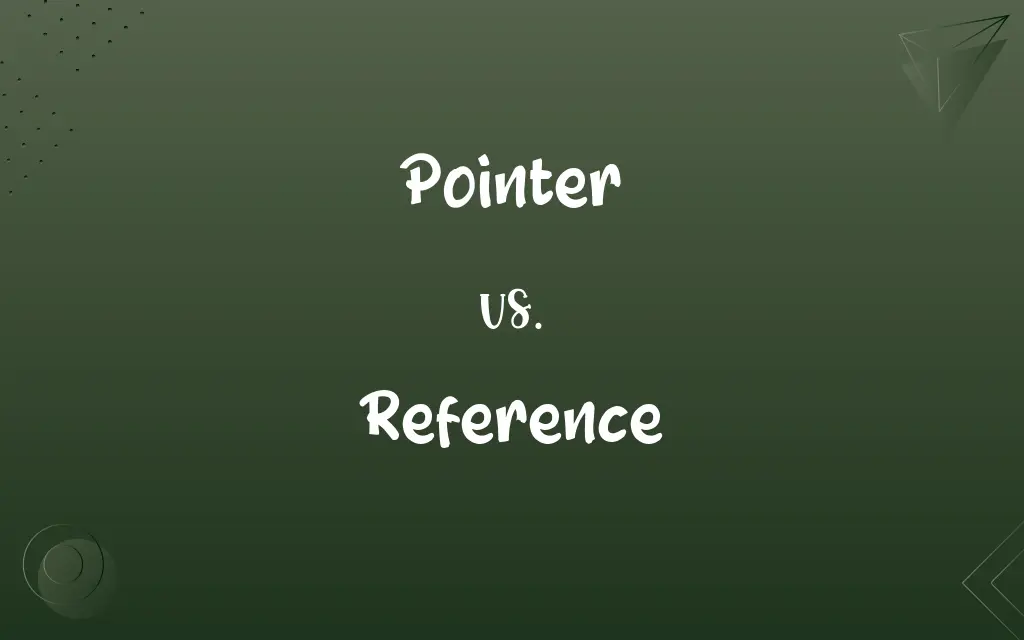Pointer vs. Reference: Know the Difference

By Dua Fatima & Hifza Nasir || Published on March 6, 2024
Pointer directly holds the memory address of a variable, enabling memory manipulation; reference is an alias for a variable, offering safer, indirect access.

Key Differences
A pointer is a variable that stores the memory address of another variable, allowing for direct manipulation of the memory location it points to. In contrast, a reference serves as an alternative name for an existing variable, facilitating indirect access and manipulation without providing the ability to change the connection to another variable.
Hifza Nasir
Mar 06, 2024
Pointers are explicitly declared and can be reassigned to point to different variables or memory locations, enabling dynamic memory management in languages like C and C++. References, however, are implicitly dereferenced and cannot be null or reassigned, promoting safer coding practices in languages that support them, such as C++.
Dua Fatima
Mar 06, 2024
The syntax and usage of pointers can be more complex, as they require explicit dereferencing to access the pointed-to value and can perform arithmetic operations. References are used just like the original variables they alias, simplifying code readability and maintenance.
Dua Fatima
Mar 06, 2024
Pointers are more flexible but also riskier, as they can lead to pointer arithmetic errors, dangling pointers, and memory leaks if not managed carefully. References provide a level of indirection with fewer risks, as they must always refer to an initialized variable and cannot be made to point elsewhere after their initial definition.
Shumaila Saeed
Mar 06, 2024
Pointers allow for passing by address, enabling the function to modify the original variable. References also allow for passing a variable by its alias, making the code look cleaner and more intuitive while achieving the same effect as passing by address.
Hifza Nasir
Mar 06, 2024
ADVERTISEMENT
Comparison Chart
Initialization
Can be initialized to NULL or a memory address.
Must be initialized to an existing variable upon declaration.
Hifza Nasir
Mar 06, 2024
Reassignment
Can be reassigned to point to another variable.
Cannot be reassigned; always aliases the same variable.
Dua Fatima
Mar 06, 2024
Syntax
Explicit dereferencing (e.g., *ptr) for access.
Used like the original variable, no special syntax for access.
Hifza Nasir
Mar 06, 2024
Nullability
Can be null, indicating it points to no variable.
Cannot be null; must refer to a valid variable.
Dua Fatima
Mar 06, 2024
Memory Address
Can perform arithmetic operations on addresses.
Cannot perform arithmetic; does not expose memory address directly.
Dua Fatima
Mar 06, 2024
ADVERTISEMENT
Pointer and Reference Definitions
Pointer
A variable that stores the address of another variable.
Int* ptr = &var;
Dua Fatima
Feb 26, 2024
Reference
Cannot be made to refer to another variable after initialization.
Int& ref = var; // ref always refers to var
Dua Fatima
Feb 26, 2024
ADVERTISEMENT
Reference
Cannot be null and must refer to a valid variable.
Int& ref = var; // var must exist
Hifza Nasir
Feb 26, 2024
Reference
Does not need to be dereferenced to access the value.
Int value = ref;
Hifza Nasir
Feb 26, 2024
Pointer
(Computers) A variable that holds the address of a core storage location.
Dua Fatima
Jan 25, 2024
Repeatedly Asked Queries
Can a pointer be null?
Yes, a pointer can be null, indicating it points to no specific memory location.
Hifza Nasir
Mar 06, 2024
Are pointers safer or references?
References are generally considered safer as they must refer to initialized variables and cannot be null.
Hifza Nasir
Mar 06, 2024
How do you declare a pointer?
A pointer is declared by specifying the data type followed by an asterisk (e.g., int* ptr;).
Dua Fatima
Mar 06, 2024
What is a pointer?
A pointer is a variable that holds the memory address of another variable.
Hifza Nasir
Mar 06, 2024
Why might one use a reference over a pointer?
References provide a safer, more straightforward way to access variables without the complexities of pointer manipulation.
Dua Fatima
Mar 06, 2024
What is a reference?
A reference is an alias for an already existing variable, which cannot be null or reassigned.
Dua Fatima
Mar 06, 2024
How do you declare a reference?
A reference is declared by specifying the data type followed by an ampersand (e.g., int& ref = var;).
Dua Fatima
Mar 06, 2024
Can a reference be reassigned?
No, once a reference is set to alias a variable, it cannot be changed to refer to another variable.
Shumaila Saeed
Mar 06, 2024
Can a reference be null?
No, a reference must always refer to an initialized variable and cannot be null.
Dua Fatima
Mar 06, 2024
Can references perform arithmetic operations?
No, references cannot perform arithmetic operations as they are aliases for variables, not memory addresses.
Dua Fatima
Mar 06, 2024
How are pointers used in dynamic memory allocation?
Pointers are used to point to memory addresses allocated on the heap, enabling dynamic memory management.
Dua Fatima
Mar 06, 2024
How do pointers and references differ in parameter passing?
Both can be used to allow a function to modify the original argument, but references make the code cleaner and more intuitive.
Shumaila Saeed
Mar 06, 2024
What are the risks associated with pointers?
Pointers can lead to issues like dangling pointers, memory leaks, and pointer arithmetic errors if not used carefully.
Dua Fatima
Mar 06, 2024
Can pointers perform arithmetic operations?
Yes, pointers can perform arithmetic operations, such as incrementing to point to the next memory location.
Dua Fatima
Mar 06, 2024
Why might one use a pointer over a reference?
Pointers provide more flexibility, such as dynamic memory management and pointer arithmetic, though with increased risk of errors.
Hifza Nasir
Mar 06, 2024
Share this page
Link for your blog / website
HTML
Link to share via messenger
About Author
Written by
Dua FatimaCo-written by
Hifza Nasir








































































